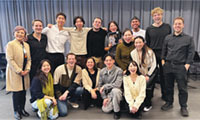Grrrr.
So what do we know about empathy and how to nurture it?First, it seems hard-wired. Even laboratory rats will sometimes free a trapped companion before munching on a food treat.
“Probably the biggest empathy generator is cuteness: paedomorphic features such as large eyes, a large head, and a small lower face,” Steven Pinker, the Harvard psychologist, tells me. “Professional empathy entrepreneurs have long known this, of course, which is why so many charities feature photos of children and why so many conservation organizations feature pandas. Prettier children are more likely to be adopted, and baby-faced defendants get lighter sentences.”
Not much we can do about looks . although criminal defense lawyers try, by having scruffy clients shave and dress up before appearing in court.
There’s also some research suggesting that wealth may impede empathy. One study by psychologists at the University of California at Berkeley finds that drivers of luxury cars are more likely to cut off other motorists and ignore pedestrians at a crosswalk. Likewise, heart rates of wealthier research subjects are less affected when they watch a video of children with cancer.
Granted, skepticism is reasonable any time (mostly liberal) academics reach conclusions that portray the wealthy in a poor light. But these experiments also find a measure of backing in the real world. For example, among Democratic politicians, personal wealth is a predictor of supporting legislation that would increase inequality, according to a journal article last year by Michael W. Kraus and Bennett Callaghan.
Likewise, the wealthiest 20 percent of Americans give significantly less to charity as a fraction of income (1.4 percent) than the poorest 20 percent do (3.5 percent), according to Bureau of Labor Statistics data.
That may be partly because affluence insulates us from need, so that disadvantage becomes theoretical and remote rather than a person in front of us. Wealthy people who live in economically diverse areas are more generous than those who live in exclusively wealthy areas.
Wealth may also turn us inward. Some experiments manipulated research subjects to think of money . such as by having them gaze at a pile of Monopoly money and imagine great wealth . and found that when a person then “accidentally” spilled pencils nearby, those thinking of great wealth were less helpful than those imagining tight budgets and picked up fewer pencils from the floor.
So how do we increase empathy?
Dacher Keltner, who runs the Greater Good Science Center at the University of California at Berkeley, says that having people think about suffering activates the vagus nerve, which is linked to compassion. He also cites evidence that uplifting stories about sacrifice boost empathy, as do various kinds of contemplation . prayer, meditation, yoga.
Keltner says that going out into nature also appears to encourage greater compassion. Feelings of awe, such as those generated by incredible images from space, seem to do the same thing, he says.
Professor Pinker, in his superb book “The Better Angels of Our Nature,” explores whether the spread of affordable fiction and journalism beginning in the 18th century expanded empathy by making it easier for people to imagine themselves in the shoes of others. Researchers have found that reading literary fiction by the likes of Don DeLillo or Alice Munro . but not beach fiction or nonfiction . can promote empathy.
I used to be cynical about student service projects, partly because they seemed so often to be about dressing up a college application, and trips so often involve countries with great beaches. (Everyone wants to help Costa Rica!) Then there was The Washington Post’s report about the Mexican church that was painted six times over the course of a summer by successive waves of visitors.
Yet I’ve come to believe that service trips do open eyes and remind students of their good fortune. In short, they build empathy.
So let’s escape the insulation of our comfort zones. Let’s encourage student service projects and travel to distant countries and to needy areas nearby. Whatever the impact on others, volunteering may at least help the volunteer. Let’s teach Dickens and DeLillo in schools, along with literature that humanizes minority groups and builds understanding.
Above all, let’s remember that compassion and rationality are not effete markers of weakness, but signs of civilization.
스마터리빙
more [ 건강]
[ 건강]이제 혈관 건강도 챙기자!
[현대해운]우리 눈에 보이지 않기 때문에 혈관 건강을 챙기는 것은 결코 쉽지 않은데요. 여러분은 혈관 건강을 유지하기 위해 어떤 노력을 하시나요?
 [ 건강]
[ 건강]내 몸이 건강해지는 과일궁합
 [ 라이프]
[ 라이프]벌레야 물럿거라! 천연 해충제 만들기
 [ 건강]
[ 건강]혈압 낮추는데 좋은 식품
[현대해운]혈관 건강은 주로 노화가 진행되면서 지켜야 할 문제라고 인식되어 왔습니다. 최근 생활 패턴과 식생활의 변화로 혈관의 노화 진행이 빨라지고
사람·사람들
more
창작 뮤지컬 ‘도산’ 웍샵
창작 뮤지컬 ‘도산’이 뉴욕 맨해튼에서 미국배우조합 리딩 웍샵을 성공적으로 마쳤다. LA 무대예술인그룹 시선(대표 클라라 신)이 제작한 이 작…

“한국어 교육 확산 협력”
한국어진흥재단(이사장 모니카 류)이 숙명여대(총장 문시연)와 한국어 교육 확산을 위한 협력에 나선다. 한국어진흥재단의 모니카 류 이사장은 지난…
송년행사 시즌 ‘돌입’ 12월 첫 주부터 본격
추수감사절 연휴를 기점으로 남가주 한인사회가 본격적인 송년행사 시즌에 돌입한다. 한 해를 마무리하고 새해를 준비하기 위한 각 단체·동문회의 연…
KYCC·VWKC·주민의회 등 합동 타운 대청소 …
한인타운청소년회관(KYCC)과 헤더 허트 시의원(LA 10지구) 사무실, 그리고 행사에는 윌셔 한인타운 커뮤니티 목소리(VWKC), 내셔널 유…
ROTC 남가주 동지회 골프 모임
ROTC 남가주 동지회(회장 이창훈)는 지난 22일 라미라다 골프코스에서 골프 모임을 열었다. 이날 행사에는 30여 명이 참석해 라운딩을 함께…
많이 본 기사
- “어머니 화장실에 숨으시라, 통화가 마지막…”
- “제3세계 이민 영구 중단 불법입국 수백만 명 추방”
- ‘尹 격노설’ 진상 밝혔지만 동기는 못 찾아… 구속은 단 1명뿐
- 韓정부, 복제약 가격 53% → 40%… 소비자 “환영” 제약사는 ‘반발’
- 韓법원 “방통위 2인체제 ‘YTN 최대주주 변경 승인’ 취소”
- ‘반인도적 범죄’ 두테르테 전 필리핀 대통령 석방 요청 기각
- 종전안에 비친 푸틴 속내…우크라 러 위성국 만들기 아니냐 관측
- 송진우·알베르토, 역사왜곡 논란..다시금 재조명된 전효성
- “조태용, 정치중립 위반”… 국정원장 구속기소
- 美, 망명신청 결정 전면중단…제3세계 이주민 차단에 속도
- 故 이순재, 올해 5월 병상 모습 공개.. “지금 하고 싶은 것? 작품 뿐”
- 한미 양국 한반도 전문가들, 워싱턴서 한자리에
- 홍콩 화재 생존자가 전한 참상… “집이라는 연옥에 갇혀”
- 장동혁 “민주당이 계엄 불러 국민 고통”… ‘투쟁’ 독려
- 야 “성추행 의혹 장경태 윤리위 제소” 압박, 여 “당 윤리감찰단 결과 지켜보겠다” 신중
- 계엄버스 탄 육군 법무실장 ‘근신→강등’
- 인도 “美와 관세 협상 마무리 단계…연말까지 1단계 협정 기대”
- ‘연 9000만원’ 연금 받으려고…3년 전 죽은 어머니로 분장한 50대 아들
- 미국 입양된 이진희씨 “온 마음으로 가족들 그리워해”
- 이민 옥죄고 바이든 지우기 박차…트럼프 ‘추수감사절 대공세’
- 아마존, ‘블프’ 대목 앞두고 외부 AI쇼핑 도구 대거 차단
- 무량일념(無量一念)-눈 쌓인 땅 속에서 파초가 솟아나 받든 팔
- 트럼프, 美서 45년刑 복역중인 온두라스 前대통령 “사면하겠다”
- 방탄소년단 2026 월드투어 매출 전망 ‘쑥쑥↑’,최대 1조4천억원 예측[K-EYES]
- 尹, 이종섭 수사 요구 거세지자 “이제 호주로 내보내자”
- “미군, 국방장관 ‘전원살해’ 명령에 격침 마약선 생존자도 살해”
- 재무 “불법체류자 연방차원 수혜 끝…소득세 환급혜택 중단”
- 가족끼리 ‘이것’ 돌려 썼다가 머리 다 빠져…겨울철 긴급 경고 나온 감염병, 뭐길래
- 트럼프 “바이든이 자동서명기로 서명한 행정명령등 全문서 취소”
- “K뷰티, 올 미국 판매 37% 급증…소비자 75%가 MZ”
- 에어버스 A320 ‘급강하 우려’ 소프트웨어 리콜…항공대란 우려도
- 재무 “불법체류자 연방차원 수혜 끝…소득세 환급혜택 중단”
- 美서 의미 퇴색한 ‘블프 세일’… “행사 진정성 사라져”
- [정지원 법률 칼럼] 데포지션(Deposition)
- MA주 공공안전보안부장관에 진아 권
- “우크라 대표단, 종전협상 위해 주말 방미…트럼프 특사 회동”
- 구글, EU서 MS 클라우드 반독점 신고 취하… “EU 조사 지켜볼것”
- 한일령 본격화..하마사키 아유미, 中 공연 하루 전 취소 “안 믿겨”[★재팬]
- 라티노 이웃과 함께 땡스 기빙
- 메이시스 추수감사절 퍼레이드
- “인텔, 애플 M시리즈 칩 생산 논의…이르면 2027년부터 출하”
- 트럼프 “제3세계출신 美이주 영구중단”…19개국 출신 체류 재검토
- ‘인종차별 징계’ 전북 타노스 코치 ‘재심’ 확정, 내달 1일 연맹 이사회서 결론
- 80여 노인들, 모국 여행을 떠나다
- 뉴욕증시, 블랙 프라이데이 소비 기대감…강세 마감
- 아이브도 기부 행렬 동참.. “홍콩 화재 참사에 50만 홍콩달러 전달”
- ‘통수돌 논란’ 前피프티 130억 소송 2번째 재판
- K-헤어케어 트리셀, Costco 250개점에 런칭
- 복수국적 한인2세 피해 방지 ‘국적유보 신고제’ 추진
- 트럼프, ‘금지된 3선’ 도전 또 암시?…SNS에 ‘2028’ 새긴 이미지
1/5지식톡

-
 테슬라 자동차 시트커버 장착
0
테슬라 자동차 시트커버 장착
0테슬라 시트커버, 사놓고 아직 못 씌우셨죠?장착이 생각보다 쉽지 않습니다.20년 경력 전문가에게 맡기세요 — 깔끔하고 딱 맞게 장착해드립니다!장착비용:앞좌석: $40뒷좌석: $60앞·뒷좌석 …
-
 식당용 부탄가스
0
식당용 부탄가스
0식당용 부탄가스 홀세일 합니다 로스앤젤레스 다운타운 픽업 가능 안녕 하세요?강아지 & 고양이 모든 애완동물 / 반려동물 식품 & 모든 애완동물/반려동물 관련 제품들 전문적으로 홀세일/취급하는 회사 입니다 100% …
-
 ACSL 국제 컴퓨터 과학 대회, …
0
ACSL 국제 컴퓨터 과학 대회, …
0웹사이트 : www.eduspot.co.kr 카카오톡 상담하기 : https://pf.kakao.com/_BEQWxb블로그 : https://blog.naver.com/eduspotmain안녕하세요, 에듀스팟입니다…
-
 바디프렌드 안마의자 창고 리퍼브 세…
0
바디프렌드 안마의자 창고 리퍼브 세…
0거의 새제품급 리퍼브 안마의자 대방출 한다고 합니다!8월 23일(토)…24일(일) 단 이틀!특가 판매가Famille: $500 ~ $1,000Falcon: $1,500 ~ $2,500픽업 & 배송직접 픽업 가능LA…
-
 바디프렌드 안마의자 창고 리퍼브 세…
0
바디프렌드 안마의자 창고 리퍼브 세…
0거의 새제품급 리퍼브 안마의자 대방출 한다고 합니다!8월 23일(토)…24일(일) 단 이틀!특가 판매가Famille: $500 ~ $1,000Falcon: $1,500 ~ $2,500픽업 & 배송직접 픽업 가능LA…
케이타운 1번가
오피니언

오바마케어 보조금 연장 이뤄져야

UC, 등록금 인상 자제 노력 더 해야한다
 마크 A. 시쎈 / 워싱턴포스트 칼럼니스트
마크 A. 시쎈 / 워싱턴포스트 칼럼니스트 [마크 A. 시쎈 칼럼] 트럼프 승리를 파괴하는 백인 우월주의자들
 유경재 나성북부교회 담임목사
유경재 나성북부교회 담임목사 [한국춘추] 감사의 힘
 김인자 시인·수필가
김인자 시인·수필가 [금요단상] 장미의 이름, 진리의 이름
 최호근 / 고려대 사학과 교수
최호근 / 고려대 사학과 교수 [역사 속 하루] 태즈메이니아 섬 발견, 비극의 시작
 최형욱 / 서울경제 기자
최형욱 / 서울경제 기자 [만화경] AI 거품론과 ‘그린스펀 오판’
 조재성 LA 포럼 회장·도시비평가
조재성 LA 포럼 회장·도시비평가 [조재성 박사의 두 도시 이야기] 코리아타운, 불완전함의 아름다움
 김재천 서강대 국제대학원 교수
김재천 서강대 국제대학원 교수 [김재천 칼럼] 경제로 안보를 사는 시대
1/3지사별 뉴스

메이시스 추수감사절 퍼레이드
올해로 99회를 맞이한 메이시스 추수감사절 퍼레이드가 27일 맨하탄에서 화려하게 펼쳐졌다. 올해 퍼레이드에는 전 세계적으로 열풍을 일으킨 ‘케…
복수국적 한인2세 피해 방지 ‘국적유보 신고제’ 추진

라티노 이웃과 함께 땡스 기빙
추수감사절 아침, 갑자기 떨어진 기온에 찬바람까지 불면서 겨울이 다가옴을 실감할 수 있었다. 도시빈민을 섬기는 굿스푼선교회(대표 김재억 목사)…
MA주 공공안전보안부장관에 진아 권

재무 “불법체류자 연방차원 수혜 끝…소득세 환급혜택 중단”
스콧 베선트 재무장관은 28일 불법체류자 및 관련 자격 미달 외국인에 대해 각종 소득세 환급 혜택을 중단할 방침이라고 밝혔다.추수감사절 전날인…
피아니스트 조성진, 내년 1월 SF에 온다

오늘 하루 이 창 열지 않음 닫기 


















































.png)


댓글 안에 당신의 성숙함도 담아 주세요.
'오늘의 한마디'는 기사에 대하여 자신의 생각을 말하고 남의 생각을 들으며 서로 다양한 의견을 나누는 공간입니다. 그러나 간혹 불건전한 내용을 올리시는 분들이 계셔서 건전한 인터넷문화 정착을 위해 아래와 같은 운영원칙을 적용합니다.
자체 모니터링을 통해 아래에 해당하는 내용이 포함된 댓글이 발견되면 예고없이 삭제 조치를 하겠습니다.
불건전한 댓글을 올리거나, 이름에 비속어 및 상대방의 불쾌감을 주는 단어를 사용, 유명인 또는 특정 일반인을 사칭하는 경우 이용에 대한 차단 제재를 받을 수 있습니다. 차단될 경우, 일주일간 댓글을 달수 없게 됩니다.
명예훼손, 개인정보 유출, 욕설 등 법률에 위반되는 댓글은 관계 법령에 의거 민형사상 처벌을 받을 수 있으니 이용에 주의를 부탁드립니다.
Close
x